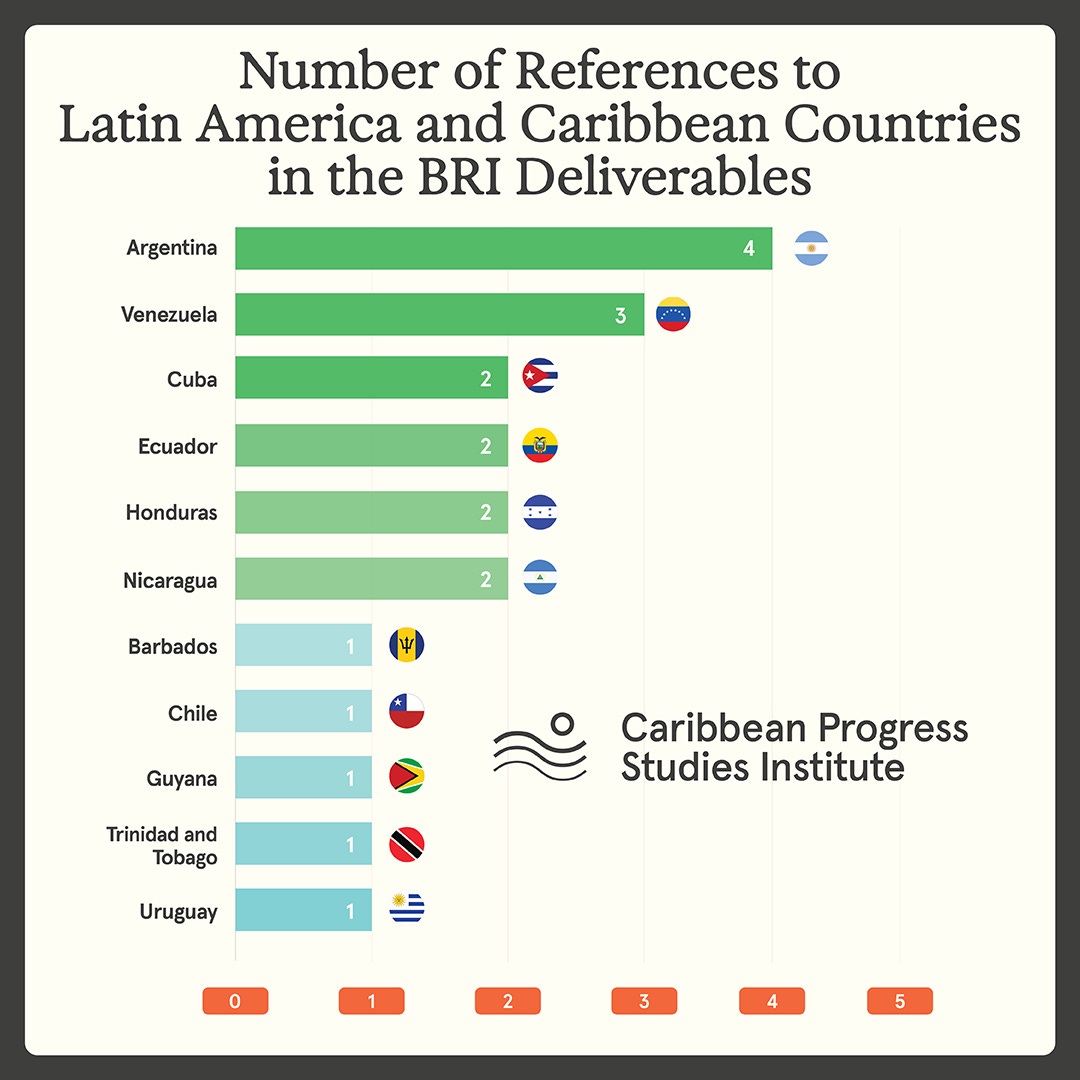Chaufa - Strong Partners
BRI summit deliverables, Mexico-China fentanyl cooperation, China's UN Haiti vote, Sinovac redirects investment to Colombia
Hi! Welcome to Chaufa, a China-Western Hemisphere Newsletter by CPSI.
Today’s Edition covers October 16 to October 22.
This Week’s Top 5 Stories:
China held its third Belt and Road (BRI) Forum in Beijing. Presidents Fernandez of Argentina and Boric of Chile attended, as did representatives from 138 other countries.
Chilean president Boric had an eventful trip to China, with a bilateral meeting with President Xi (FMPRC) and new deals announced for lithium battery factories, lithium mining, salmon exports, digital cooperation with Huawei, and 13 bilateral agreements on topics ranging from the Antarctic to the digital economy.
While Argentina’s President Fernandez was in Beijing to discuss investment, agriculture cooperation, and space cooperation, Argentina’s central bank activated a $6.5 billion swap line with the PBOC to increase the country’s depleted foreign currency reserves.
Mexican diplomats and law enforcement officials traveled to China to discuss combatting the illegal trade in fentanyl precursor chemicals with the Ministry of Public Security under a newly established working group.
The news comes just a week after U.S. Ambassador Burns complained that China had refused sustained conversations on the topic and Senator Schumer raised the issue in his meeting with President Xi.
Following the BRI summit, Nicaragua’s finance ministry signed a $70 million agreement with China Communications Construction to build a solar plant, while the government signed an MOU with China Civil Engineering Construction Corporation (CCECC) to build multiple new rail lines across Nicaragua. A hydroelectric project in Tumarín, an airport reconstruction project, and a coastal highway will also be supported by Chinese firms.
China supported the unanimously-passed UN Resolution 2700 that renews arms sanctions against Haitian gangs. (Xinhua)
Sinovac will redirect its planned $100 million vaccine plant in Chile to Colombia due to local market conditions.
My Take
Putting the BRI Summit in Context
The PRC wrapped up its third BRI forum this week with a host of announcements detailed in a list of 369 deliverables. Among these “practical outcomes” were what appears to be a major announcement: new $350 billion RMB ($48 billion USD) financing windows for the China Export-Import Bank (EXIM) and the Chinese Development Bank (CDB), as well as $80 billion RMB ($11 billion USD) for the Silk Road Fund.
With these eye-popping figures, the devil will be in the details. A $100 billion commitment is nothing to sneeze at, but the Chinese have not specified whether they intend to draw down these capital windows over one year, ten years, or a different time frame, nor have they said whether these designated BRI windows will come at the cost of other China EXIM and CDB lending.
For context, $100 billion is about what the World Bank spends, loans, and guarantees in a year, while the U.S. Export-Import Bank supported around $15 billion in new authorizations 2023. Given that China’s official lending has only topped $100 billion once since the BRI was announced, it seems more likely that this is a flashy number that will be disbursed over many years rather than a radically new commitment to BRI lending in 2024.
In addition to the unclear numbers, much of what was attributed to the forum was months or even years old: among the summit’s achievements were the Guyana East Coast Demerara Road Project Phase I (from 2020), the Phoenix Industrial Park in Trinidad and Tobago (which has been under discussion since at least 2018), and the FTAs in Nicaragua and Ecuador.
For the Caribbean in particular, the list of deliverables appears to be a bit of a bust. Only four Caribbean countries were mentioned in the 369 deliverables: Barbados, Trinidad and Tobago, Cuba, and Guyana.
This was part of a broader trend for the region, with Latin American and Caribbean countries mentioned by name only 20 times in the entire document. By contrast, Indonesia and Cambodia were each mentioned by name 17 and 15 times respectively. While this doesn’t discount possible future engagement1, coming out of the summit, it is clear the region is not looped in to the BRI in the way as other countries across Asia, Europe, and Africa.

The Roundup
Politics and security
The Singaporean press reported that several Chinese nationals that were arrested in one of the country’s largest money laundering scandals had secondary Caribbean passports, which comes as the European Union published a report warning about Caribbean passport sales to Chinese (and Russian and Iranian) nationals.
MOFA DG for Latin America and the Caribbean Cai Wei met with Dominican Republic representatives this week on the sidelines of the BRI forum to discuss bilateral development cooperation.
The head of Cuba’s communist party’s international section met with his counterpart in Beijing to discuss bilateral cooperation, especially around economic development. (Escambray)
U.S. SOUTHCOM Commander Richardson warned about China’s potential military space observation and surveillance base in Argentina’s Patagonia region in an interview with the Foundation for Defense of Democracies.
Canada’s intelligence chief cautions against Chinese interest in partnering with local universities to improve its military capacity, while the defense minister accused China’s PLA of recklessness when a fighter flew within 5 meters of a Canadian jet.
Investment, finance, and infrastructure
China’s Lingong Machinery Group (LGMG) announced an industrial park in Nuevo Leon, Mexico that is expected to focus on processing and manufacturing, warehousing and logistics, and business support services and to draw $5 billion in investments.
The Chinese consortium ENFI-CRIG beat Sinosteel to build the China Ex-Im financed, $350 million zinc processing plant in Oruro, Bolivia.
China’s ambassador to Honduras visited the Puerto Cortés cargo terminal to analyze future investment opportunities.
Leaders from Peru’s ProInvestment agency met with major Chinese corporations to discuss investment opportunties, including a $762 million industrial park north of Lima.
Trade and technology
As the United States eases sanctions on Venezuela, experts suggest the South American country’s oil exports will be diverted from China to the United States.
The head of the Jamaica Coffee Exporters Association warned that new Chinese registration requirements could harm the local coffee industry if the Jamaica Agricultural Commodity Regulatory Authority (JACRA) doesn’t resolving its outstanding issues with the Chinese customs administration.
The Chinese embassy in the Dominican Republic expressed interest in expanding technological cooperation in the agriculture sector in a meeting with the national irrigation agency.
Cuba’s Deputy PM met with the head of China’s state tobacco monopoly to discuss technological cooperation and JD.com to discuss e-commerce collaboration. (Prensa Latina)
Taiwan
Taiwan coordinated a humanitarian evacuation flight for four Guatemalan citizens who had been stuck in Israel.
A Taiwanese medical mission is visiting Belize, while it was also announced that the ROC will donate nearly $750,000 to renovate the country’s National Assembly building.
Despite the split in diplomatic relations, Taiwan continues to import more than a third of Honduras’s shrimp exports.
Members of the Paraguayan House of Deputies’ Foreign Relations Committee met with the Taiwanese ambassador to discuss parliamentary diplomacy and trade.
Nicaraguan President Ortega called Taiwan a “province of China” in a recent speech, sparking backlash from Taiwan’s foreign ministry.
Analysis and Opinion
Robertson Henry and Brian Ellsworth are in Americas Quarterly reviewing Taiwan’s relationship with its remaining Caribbean diplomatic partners.
Writing for the Diplomat, Evan Ellis wrote about a recent FIU forum comparing Latin America’s and Africa’s relationship with China.
A piece by Dean Cheng for the U.S. Institute of Peace argues that the United States needs to mobilize its financial, intellectual, political and cultural resources to invest in Latin America and the Caribbeanto counteract China’s influence.
In The Global Americans, William Zolinger Fujii writes about Brazil’s attempt to navigate a middle path between rising tensions between the United States and China.
AS/COA held an event on the Impact and Implications of China’s Authoritarian Capital in the Americas.
That’s it for now! See you next week.
Make sure you don’t miss the next issue of Chaufa 👇
Notably, the deliverables also included reference to a “Report on Development of China-Latin America and the Caribbean Jointly Building the BRI” that China will apparently release in the near future.





